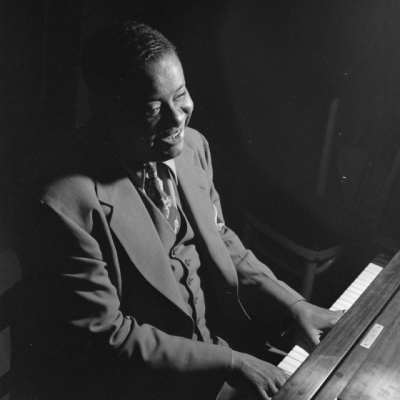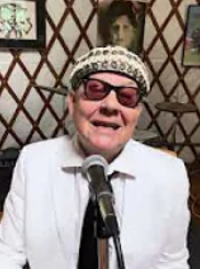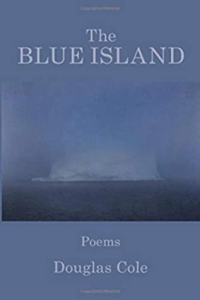.
.
Trading Fours with Douglas Cole is an occasional series of the writer’s poetic interpretations of jazz recordings and film.
In this edition, he writes about the genius of Art Tatum.
A recording of Mr. Cole reading his work (accompanied by the guitarist Chris Broberg) is found at the conclusion of the poem.
.
.
___
.
.
photo by William Gottlieb/Library of Congress

Art Tatum, c. 1946
.
___
.
.
Energy Man
Or
God is in the House
.
Art Tatum plays fast
fast as Sundays
fast as sunset in November
fast as a hurry up offense
fast as a 20 dollar bill flying down the street
fast as empty lot dirt blown across the sidewalk
fast as a bus pulling away from your stop
fast as at last getting paid
fast as a current exchange
fast as a palm slap with a sealed packet
fast as the heart racing on a rail
fast as knee jitters in a white fluorescent tunnel
fast as a flash of anger
fast as running in fear
fast as finally getting out of here
fast as knowing time to get out of here
fast as a vehicle flying through the night
…………….not another soul in sight
fast into shelter family territory of safety
…………….laughter and the smell of good things
Art Tatum plays fast to get through
…………….neither created nor destroyed
…………….on a run on a scale of 10×1010,000th
fast as the light speed of frictionless freedom
fast as fingers made of joules
fast as going from one form to another
……in a boxcar of faces on a fast train ride
……on the way to the next concert hall
…………….or the heaven of music
Fast as the sacred sound
…………….Nada brahman in the hands
…………….with heat Halo over the head
…………….radiant as a ricochet from one
…………….nodding listener to another
…………….energy transfer joy and liberation
Fast fast faster than a speeding bullet
fast enough to double in size
fast enough to fly through a black hole
fast enough to stand beside yourself
fast enough to look back at what’s to come
…………….as the universe hums its raga articulated
…………….by the desire to create the constant monotone
…………….taking place before and in your very eyes
Faster than striding the universe in seven league boots
faster than a pop-up party after hours
faster than an offering basket
…………….traveling down a church pew
faster than a fastball pitch
faster than Fats Waller
faster than James P Johnson
faster even than Earl Hines
Faster than the buzz of a Scalosian
…………….in the wink of an eye
faster than a radio signal traveling over Toledo
faster than a cutting session with
…………………………………Willie
…………………………………….“The Lion”
………………………………………….Smith
energy undiminished even with a fast shot thrown back
…………………………………and a fast spin through sophisticated lady
faster than the tempo of a hot spring geyser
…………….hitting the air at 376 beats per second
faster than the snap of a Papst Blue Ribbon lid
faster than a stint in Hollywood
faster than the fast-drum hands of Louis Prima
faster than a ride on the Starlight express
faster than the march of time
faster than a leap into the upper intervals
…………….and out of this world
And while the Emperor Joseph and Salieri
and even Keith Jarrett say, “Too many notes!”
Speed creates its own density
…………….kinetic and expanding
…………….but always and remember this:
…………….the energy of the universe is constant
…………………..electric gravitational Qe
And lightning in a bottle is hammering the keys
…………….while the great golden egg of the world
…………………………..rises from the sea.
.
Listen to Douglas Cole (accompanied by the guitarist Chris Broberg) read “Energy Man, Or, God is in the House”
.
___
.
.
Listen to the 1950 recording of Art Tatum playing “Willow Weep for Me” [Universal Music Group]
.
.
.
___
.
.
photo by Jenn Merritt
 .
.
Douglas Cole has published six collections of poetry and The White Field, winner of the American Fiction Award. His work has appeared in several anthologies as well as journals such as The Chicago Quarterly Review, Poetry International, The Galway Review, Bitter Oleander, Chiron, Louisiana Literature, Slipstream, as well Spanish translations of work (translated by Maria Del Castillo Sucerquia) in La Cabra Montes. He is a regular contributor to Mythaixs, an online journal, where in addition to his fiction and essays, his interviews with notable writers, artists and musicians such as Daniel Wallace (Big Fish), Darcy Steinke (Suicide Blond, Flash Count Diary) and Tim Reynolds (T3 and The Dave Matthews Band) have been popular contributions. He has been nominated twice for a Pushcart and Best of the Net and received the Leslie Hunt Memorial Prize in Poetry. He lives and teaches in Seattle, Washington.
Douglas’ poem, “What We Talk About When We Talk About Kind of Blue,” published as part of his “Trading Fours” series, was nominated for the XLVIII Pushcart Prize
Click here to visit his website.
.
.
The poet’s collection, The Blue Island
.
.
___
.
.

Initially inspired by Texas bluesman Lightning Hopkins, Chris Broberg studied jazz guitar in San Diego, California and has been performing jazz , blues, and original music since the 1990s. He currently resides in Bellingham Washington.
Click here to visit his YouTube page
Click here to visit his Facebook page
.
.
___
.
.
Click here to read previous editions of Trading Fours with Douglas Cole
.
Click here to read The Sunday Poem
Click here to learn how to submit your poetry or short fiction
Click here to subscribe to the Jerry Jazz Musician newsletter
Click here to help support the continuing publishing efforts of Jerry Jazz Musician (thank you!)
.
.
___
.
.
Jerry Jazz Musician…human produced (and AI-free) since 1999
.
.
.




































What an homage to the legendary Art Tatum…love it.